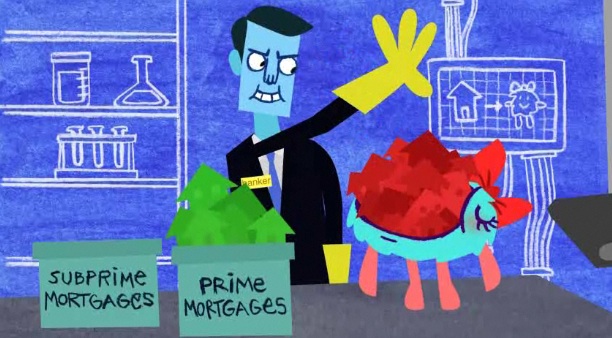
Nelson Hsu, Heather Murphy, David Kestenbaum, Chana Joffe-Walt/NPR
At the beginning of the year, the savvy reporters over at NPR’s Planet Money purchased their very own toxic asset. You know, the financial products, made up of home mortgage loans, that were at the heart of financial crisis. These assets earned investors a steady return while the housing bubble grew, in the mid-2000s. But as borrowers started defaulting on their mortgages and the financial sector imploded, these assets forged out of home loans turned, well, toxic, toppling banks and causing some trillions of dollars in losses to the economy. NPR’s financial reporters decided to buy one such toxic asset, warmly named “Toxie,” to understand exactly how these creatures worked. Throughout the year, they tracked Toxie’s declining health, as more of the loans backstopping the asset went sour, and even flew down to Florida to meet the borrowers whose loans went into Toxie. (Those reports are classic; they’re here and here.)
Today, I arrived at work to sad news: a message from David Kestenbaum, one of the Planet Money reporters, saying Toxie had died. To mark the occasion, here’s a fantastic animated video imagining Toxie’s funeral and telling her story:
And here’s a rundown, via Kestenbaum, of what the Planet Money crew say they learned from the experiment:
- Toxic assets really are toxic. Toxie was a slice of a giant bond filled with some 2,000 mortgages from around the country. Half of those homeowners are not making payments or have been foreclosed on. The Planet Money team lost over half the money they spent on Toxie. That, despite careful research and the help of experts in purchasing her.
- Toxie was a snapshot of the housing market: With the help of an investigative reporter in Florida, our reporters managed to find some of the homeowners whose mortgages are in Toxie. (This is no easy task, Toxie came with 300 pages of documentation, but not the addresses of the actual mortgages.) Some of the homeowners they met were people who had overstretched to buy a dream home. But others were investors who had purchased multiple homes in hopes of making money. And one mortgage from Toxie is listed in an FBI affidavit as fraudulent and possibly connected to a large house flipping scheme.
- Toxie is survived by many other toxic assets: Remember, during the crisis, how people worried some of the world’s largest banks might be insolvent? A major reason was that they held toxic assets, and no one knew what they were worth. We now know what one was worth. Toxie turned out to be worth $449.06. But there are many more bonds like her out there. Toxie is survived by millions of investors and homeowners, who are part of some other toxic asset’s story. Two years into this mess, the housing market is still unstable and we don’t know how those stories will end.
I won’t add any more other than to say, Damn you, Toxie—you should’ve stuck it out a bit longer. The “Toxie” project (the full catalog of stories is here) was probably one of my favorite pieces of financial reporting throughout this entire mess. She’ll be missed.






